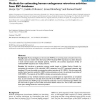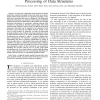2512 search results - page 68 / 503 » Learning from Highly Structured Data by Decomposition |
LWA
2007
15 years 1 months ago
2007
The emergence of collaborative tagging systems with their underlying flat and uncontrolled resource organization paradigm has led to a large number of research activities focussi...
101
click to vote
BMCBI
2007
14 years 12 months ago
2007
Background: Human endogenous retroviruses (HERVs) are surviving traces of ancient retrovirus infections and now reside within the human DNA. Recently HERV expression has been dete...
115
click to vote
ICTAI
2006
IEEE
15 years 6 months ago
2006
IEEE
We present an ensemble learning approach that achieves accurate predictions from arbitrarily partitioned data. The partitions come from the distributed processing requirements of ...
112
click to vote
WSDM
2010
ACM
15 years 9 months ago
2010
ACM
Tagging plays an important role in many recent websites. Recommender systems can help to suggest a user the tags he might want to use for tagging a specific item. Factorization mo...
TNN
1998
14 years 11 months ago
1998
—A structured organization of information is typically required by symbolic processing. On the other hand, most connectionist models assume that data are organized according to r...


